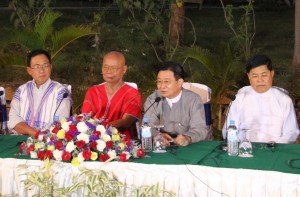A number of reports by a diverse range of international and local organizations have scrutinized Burma’s government and while applauding recent positive changes, found it wanting in all functions of government from political inclusion, to rule of law to land rights to healthcare.
 Professor Desmond Ball of the Strategic and Defence Studies Centre at the Australian National University in Canberra points out that Burma’s ethnic peoples’ have been fighting for a political say in the running of the nation for more than 60 years.
Professor Desmond Ball of the Strategic and Defence Studies Centre at the Australian National University in Canberra points out that Burma’s ethnic peoples’ have been fighting for a political say in the running of the nation for more than 60 years.
“Previous government responses to their calls for political inclusion has been to divide, kill, dislocate and jail its opposition. Ethnic political aspirations have not been taken serious by Burma’s military backed government or the international community.”
Despite the rush to applaud Burma’s government for releasing political prisoners and signaling their intent that they are open for business, countless reports and briefing papers written by local and international organisations warn of the critical need to resolve the critical issue of sharing political power with the country’s ethnic people.
In a speech to United Nation’s Human Rights Council on 12 March 2012, the Special Rapporteur on the Situation of Human Rights in Myanmar, Mr. Tomas Ojea Quintana reinforced that the government needs to take its ‘peace-talks’ with ethnic groups seriously.
“I therefore reiterate my call for the Government to develop a comprehensive plan to officially engage ethnic minority groups in serious dialogue and to resolve long-standing and deep-rooted concerns. Ending discrimination and guaranteeing respect for the rights of ethnic minorities is essential for national reconciliation and for Myanmar’s long-term political and social stability.”
An earlier report released in 2007 by the East-West Center Washington, Assessing Burma’s Ceasefire Accords, its authors, Zaw Oo and Win Min pointed out that the previous regime did not understand ethnic aspirations.
“Merely providing some economic incentives and development projects will not be enough. If ethnic minority aspirations are not met at some point, rising frustrations over ethnic discrimination and the denial of autonomy may lead a new generation of ethnic minorities to take up arms.”
After another failed ceasefire with the Karen in 2004, the International Crisis Group in 2003, warned in its Asia Report that the ethnic people of Burma were continually been ignored and left out of the country’s political decision-making process.
“The most fundamental grievance of ethnic minorities in Myanmar today is their lack of influence on the political process and thus on decisions that affect their lives.”
The ICG report noted that ethnic people accused the government of “a deliberate policy of ‘Burmanisation’. They feel not only marginalised economically, but also that their social, cultural and religious rights are being suppressed.”
A more recent report by the Transnational Institution (2009), Neither War Nor Peace, echoes Professor Ball’s concerns about the political exclusion of Burma’s ethnic minorities.
The TNI report concluded that, “Without a political settlement that addresses the ethnic minority issue, it is extremely unlikely there will be peace and democracy in Burma.”
The Karen National Union is not alone in being frustrated that the government is only interested in the primary stage of achieving a ceasefire agreement that denies any mention of a long-term peace plan.
General Gun Maw, the vice-chief of staff of the Kachin Independence Army and head of the Kachin Independence Organisation’s Foreign Affairs Department, is at the time of writing, fighting a war against the government’s military and has said.
“We had a 17-year ceasefire with them [government] that they refused to ratify in writing. Today, we are asking for a signed agreement and again they refuse to sign – why? Ceasefire agreements are not peace. The government has used various ceasefire agreements with ethnic groups to their own advantage, mainly to claim that a particular ethnic area is now peaceful.”
General Gun Maw said the government’s attempts to offer ceasefires to ethnic armed groups do not go far enough.
“The KIO [Kachin Independence Organisation] policy is that we want the government to solve the country’s political problems by political means. We want a guarantee that there will be meaningful political dialogue. The government and the president have still not answered our question – what is the government’s plan for a peace dialogue for the whole country?”
Saw David Tharckabaw, the Karen National Union’s former vice-president and now head of Alliance Affair Department said the fighting and war being waged by the Burma military against the Kachin should be strong motivation for all ethnic groups to stay united.
“17 years-ago they [government] isolated the Karen by making a quick ceasefire with the other armed groups, including the Kachin – now it’s the Kachin’s turn to be isolated.”
Saw David Tharckabaw’s like many ethnic people believe the war is a deliberate strategy to keep the ethnic armed groups divided.
“The KNU wants a genuine peace, but with justice and national reconciliation. We want a political solution…that is we want rules and regulations. We want peace, not slavery.”
*Saw Wei Thoo is a journalist and a founding member of www.karennews.org



